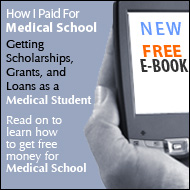Options to Pay for Your Schooling
 |
|
||
 |
 |
||
First Off, Fill Out a FAFSA
Before you look into any kind of payment options, it is recommended that you complete a Free Application for Federal Student Aid (FAFSA). This form is the first step in the financial aid process and it will give the government the information it needs to determine your eligibility for federal financial aid, as well as the best options to suit your individual situation. Also, almost all two-year and four-year colleges, universities and career schools use the FAFSA to award state and college financial aid.
Filling out this form takes a little time and planning as it requires you to provide a lot of detailed information such as your social security number, driver's license number, federal income tax return information, your parents' federal income tax return information (if you are a dependent), bank statements, etc. However, it is worth the time and effort because the outcome could be grants, low-interest loans, work study, and more beneficial sources that will help you in paying for your schooling.
When filling out your FAFSA, make sure that you fill the form out completely and accurately. Do not lie about income, tax return amounts, etc. Fudging numbers will not guarantee you any better results, so be honest. Also, there are deadlines that the FAFSA needs to be completed by, so make sure that you are aware of the exact date the form is due and plan accordingly.
A common mistake made by those seeking some kind of assistance is that they assume they will not qualify for any kind of Federal Financial Aid. Don't assume this! Fill out the FAFSA even if you think getting any type of financial aid is a long shot. There are several loans, such as PLUS Loans and unsubsidized Stafford Loans, that can be obtained regardless of need.
Get Free Money "Granted" to You
Grants are another means of paying for your education and can be obtained through the federal government (such as a Pell Grant) or through your school (such as a federal Supplemental Educational Opportunity Grant "SEOG"). Grants are a need-based form of financial aid and are used to compensate the cost of one's schooling. The great thing about grants is that like a scholarship, they do not have to be repaid. The Expected Family Contribution (EFC) section of the FAFSA that you will complete will determine whether you are eligible for a federal grant.
Save with Scholarships
Scholarships are awarded through colleges or universities and private organizations or companies. The basis for qualification varies from each school or organization. Check with the school that you plan on attending for a comprehensive list of scholarships that it awards. As with federal financial aid, do not assume that you will not qualify for scholarships. There are organizations that have scholarships for everything under the sun, from adult students, minorities, to blondes and duck-callers, so you are bound to find one that is applicable to you.
Check out the search option available at the Medical School Loans website to view thousands of scholarships, complete with application information and any requirements.
Get a Loan
Most students take out some form of student loans to pay for their education. Something to keep in mind about loans is that you will eventually need to repay the amount you borrowed plus interest, so a good rule of thumb to follow is to only borrow what you absolutely need.
There are two types of loans, federal loans and private loans.
Federal Loans
Federal loans are guaranteed by the federal government, and have low-interest rates. Of the two types of loans, federal loans more often than not, are the less expensive of the two. They also offer in-school deferment options and grace periods before repayment begins, which allow students to pay absolutely nothing while they are in school.
There are no credit checks with federal loans. This allows students who have not yet established a credit history, or who have a poor credit history, to have a loan option. Also, with federal loans, there are no origination fees, no prepayment penalties and no need for cosigners. In the unfortunate event that the borrower dies, all of the borrower's federal loans will be forgiven.
Federal Loans Options
The types of Federal Loans that are available include:
- Stafford Loans
- Subsidized
- Unsubsidized
- Perkins
- Federal Parent Loan for Undergraduate Students PLUS
- Graduate PLUS
- Federal Consolidation Loans
Private loans, or alternative loans, are funded by private financial institutions such as banks, schools, etc. They tend to have higher interest rates than federal loans but have higher loan limits and are available whenever the need arises. This means that if you miss the FAFSA deadline, you can still qualify to take out a private loan. Also, private loans are not need-based, so regardless of your income or lack there of, you may qualify for a private loan.
Private loans may also assist international students with paying for school, as some private lenders allow for international students to apply for private loans with an eligible U.S. cosigner.
The main disadvantage to taking out private loans is that they are credit-based and require a credit check. Your credit rating determines your eligibility as well as your interest rates, loan limits and origination fees. If you have poor credit, or if you have not yet established credit, you may need a cosigner to qualify for a private loan.
To save money in the future, consider consolidating your federal student loans and/or your private student loans. Consolidating your outstanding student loans with a consolidation company like Medical School Loans will give you just one loan with one low monthly payment, which could save you thousands of dollars over the life of your loans.
Qualify for Work Study
Federal Work Study Program allows students with financial need opportunities for employment at the college or university that they are enrolled at. The student works several hours per week. The money earned is used as a means of financial aid to pay for schooling and the cost of living. Because the money is earned, students participating in this program do not have to pay anything back.
Forget about Student Loan Debt with Forgiveness Options
If you do decide to take out student loans, check to see if you are eligible to participate in any loan forgiveness programs. Forgiveness programs can compensate all or part of your school loans, depending on the field that you are going into. These programs are provided by the federal government, state government, military and other organizations and agencies throughout the country. They offer part or full reimbursement on school loans in exchange for a commitment from a recent graduate to work in a field or area pre-determined by the organization. These forgiveness and repayment programs are very similar to scholarship programs. Each organization's criteria, the amount that they offer to pay and the length of time they expect you to commit differs depending on the organization.
Look for Other Options
This is not an exhaustive list of possibilities to pay for your education. Check with your specific college or university for other financial aid options that may exist.
|
||||||||||||||||||||
+ Consolidate Your Private Student Loans Now! (Save Thousands!!)
Tell A Friend
 |
|
The Healthcare Career Resources column is presented by HealthcareCrossing, America's leading job search site dedicated to getting jobs for healthcare professionals.
Save Money with a Private Student Loan Consolidation from Medical School Loans By Brooke Heath Even as a young child practicing medicine on your stuffed animals, you knew that you were destined to become a physician. But the road to obtaining your medical degree takes more than just the ability to mend the imaginary wounds of a teddy bear. + read more |


| CALCULATORS | |
| Stafford Loan Payment Calculator | |
| PLUS Loan Payment Calculator | |
| Loan Consolidation Payment Calculator | |




